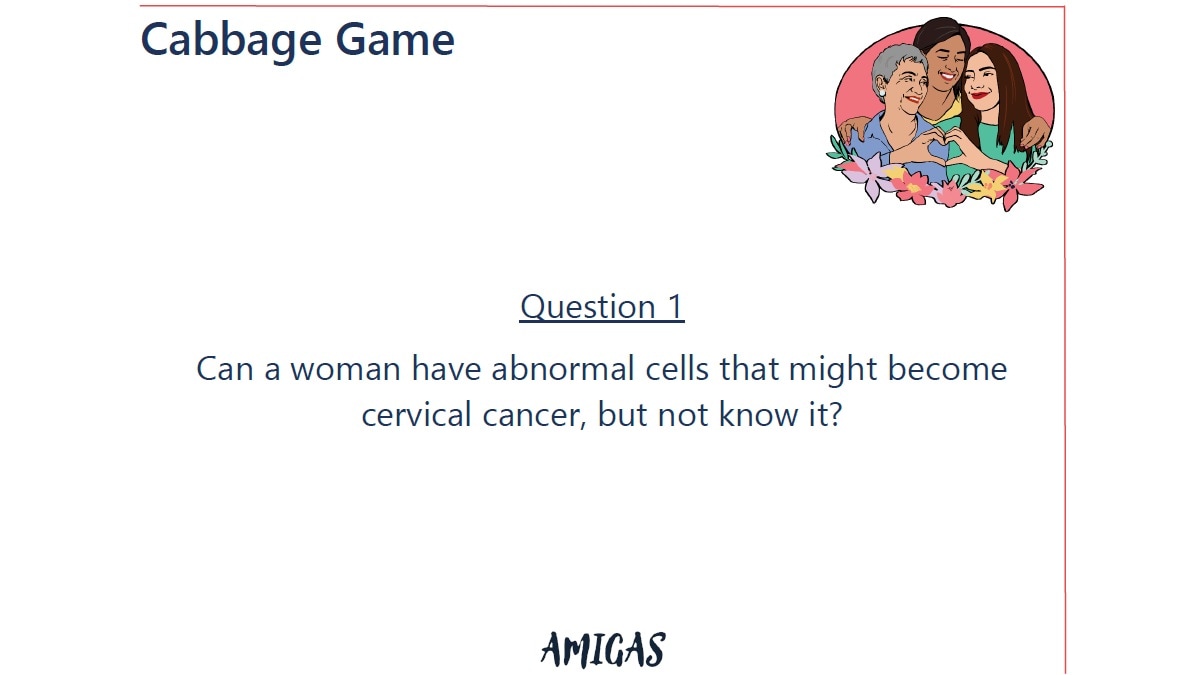What to know
The Cabbage Game is a fun way to review information in the presentation.
Overview
This game is used in an AMIGAS group session to review knowledge of information in the presentation:
- What is cervical cancer?
- Who can get cervical cancer?
- What is a Pap test?
- Who should get a Pap test and how often?
- What is an HPV test?
- Who can get an HPV test and how often?
- Why is it important to get screened for cervical cancer?
Materials: For in-person sessions, use 10 sheets of blank green paper to make a paper cabbage as described below.
Number of Players: Three or more
How to make a paper cabbage
- Print each question on one sheet of green paper.
- Start with the sheet with question 10.
- Make a circle by joining your thumb and index finger and place the center of the sheet over the circle. Push down gently as shown in Figure 1.
- Pinch the middle of the sheet and form a stem by tightening your fist as shown in Figure 2.
- Repeat steps 2 through 4 with each of the remaining sheets.
- Place the sheet with question 10 in the middle and add the next sheet to the outside as shown in Figure 3. Then add the remaining sheets one at a time. As you add each sheet to the outside, pinch them together. Note that each additional leaf is added to the outside of the cabbage, so question 10 should be on the inside leaf and question 1 should be on the outside leaf.
- When you have all 10 leaves, your cabbage should look like the picture in Figure 4.




How to play (in-person session)
- Ask the women to stand in a circle.
- All the players clap while everyone chants "The cabbage is hot, the cabbage is hot, it BURNS!"
- Players pass the "cabbage" to the person on the right.
- After the players say, "It BURNS!" the clapping stops. The woman who is holding the cabbage when the chanting stops peels off a "leaf" (sheet of paper) and reads the question or true-false statement out loud to the group. She then tries to answer the question. If she cannot answer it, she can say "I pass" and then pass the "cabbage" and her question to the next woman in the circle. Then that woman can try to answer—she can also pass if she wants to.
- When the question has been answered correctly, the "cabbage" is passed again to the right and the chanting continues.
- Use the answers below to ensure that the questions are answered correctly. If any answer is incorrect or not very clear, you can step in and help the women with the answers as necessary.
- Keep playing until all of the sheets are gone.
Things to remember
- You will take the "cabbage" with you to the session.
- Make sure no one feels bad or embarrassed about her answers or opinions. You could tell the women something like, "You should not worry if you don't know the answer to any of these questions. We are all here to learn and share together."
- Try to give everyone a chance to remove a "cabbage leaf" and answer a question.
- The Cabbage Game should not take more than 15 minutes to play.
How to play (remote session)
If the session is being held remotely via teleconference, you can read the questions aloud and any participant can answer.
Questions and answers
1. Can a woman have abnormal cells that might become cervical cancer, but not know it?
Yes. Women can have abnormal cells and not have any symptoms.
2. True or false: Cervical cancer is easier to treat if it is found early.
True.
3. Who can develop cervical cancer?
Any woman who has a cervix can develop cervical cancer.
4. Carolina started having sex when she was about 15 years old. Now she is 50. Is she more likely to develop cervical cancer?
Yes. Women who start having sex at an early age are more likely to develop cervical cancer.
5. Bea is 45 and smokes cigarettes. She thinks she does not have to worry about developing cervical cancer. Is she correct?
No. A woman who smokes cigarettes has a higher chance of developing cervical cancer.
6. What is a Pap test?
A test used to find abnormal cells in the cervix.
7. Stella is only 21 years old and is not having sex with anyone. Does she need to get screened?
Yes! Every woman should get a Pap test starting at age 21, even if she is not having sex. Stella should have a Pap test every 3 years. She has additional options from ages 30 to 65 years.
8. If I am not having my period anymore, do I need to get screened?
Yes! If a woman is age 21 to 29, she should get a Pap test every 3 years. After age 30, a woman has 3 choices: a Pap test every 3 years, an HPV test every 5 years, or a Pap test and HPV test every 5 years. After age 65, you may be able to stop screening OR you may need to get screened if you haven't been screened in awhile and have not had a hysterectomy. Talk with your doctor.
9. What are two reasons it is important to get screened for cervical cancer?
- If abnormal cells are found and treated early, cervical cancer can usually be prevented.
- Women with abnormal cells may feel no symptoms, but a Pap test can find them.
- Cervical cancer can usually be cured if found early.
- We can learn if we have HPV (the virus that causes most cervical cancers).
- We want to protect our health!
10. How can cervical cancer screening save women's lives?
A Pap test can find cervical cancer early. An HPV test can detect if we have the virus that causes cervical cancer. It is better if we and our health care providers have more information about our health. When cervical cancer is found early, it is highly treatable.

